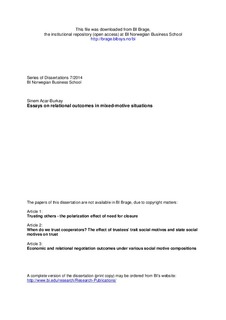| dc.description.abstract | The current dissertation comprises three chapters, each of which is a separate research article, on relational outcomes in mixed-motive situations. Chapter 1 uncovers how trustors’ social-cognitive motivation to manage uncertainty, which is captured by their need for closure, has a polarizing effect on their trust in others. Because issues of trust inherently involve uncertainty, and because need for closure is directly related to one’s level of comfort with ambiguity and uncertainty, it is predicted and documented in five studies that a trustor’s high, but not low, need for closure can lead to polarized (i.e., very low or to very high) trust judgments in social interactions, depending on the social distance between the trustor and the trustee. That is, individuals with a high need for closure have an exaggerated tendency to put high trust in close others and low trust in distant others. Furthermore, findings reported in Chapter 1 also show that individuals with high need for closure have difficulties overcoming their initial high or low trust judgments even in the presence of actual trustworthiness feedback.
Research reported in Chapter 2, which is based on the premise that social behavior is a function of characteristics of the person and the environment, examines the interaction effect between trustees’ assigned social motive (i.e., cooperative or individualistic) and their social value orientation (i.e., prosocial or proself orientation) on how much they are trusted. Results of the three studies in Chapter 2 provided converging evidence that trustees were trusted more when they had a cooperative rather than individualistic social motive, but only when they had a prosocial (vs. proself) social value orientation. Findings reported in Chapter 2 are remarkable in that they held even when the trustors were not informed about either the social value orientation or the role of the trustees but rather implicitly inferred the this information from the trustees’ behaviors. Mediation analysis results showed that these findings were explained by the perceived authenticity of the trustees’ cooperative behaviors.
Chapter 3 invstigates the relations between the social motive composition of a dyad (cooperative, individualistic, mixed), negotiation strategies, profits and relational capital. A simulated negotiation experiment was conducted, and a total of 108 negotiation sessions were audiotaped, transcribed and coded. Results showed that mixed dyads achieved higher profits than did cooperative and individualistic dyads and that this effect was mediated by negotiators’ reliance on problem solving strategies. Results also showed that cooperative and mixed dyads experienced higher relational capital than did individualistic dyads and that this effect was mediated by negotiators’ reliance on relationship management strategies. Exploratory individual-level analyses provided insight into the role of cooperators and individualists in mixed dyads. Moreover, a follow-up survey revealed that relational capital persisted beyond the study period and also predicted negotiators’ future behavioral intentions, whereas profits did not. | nb_NO |
